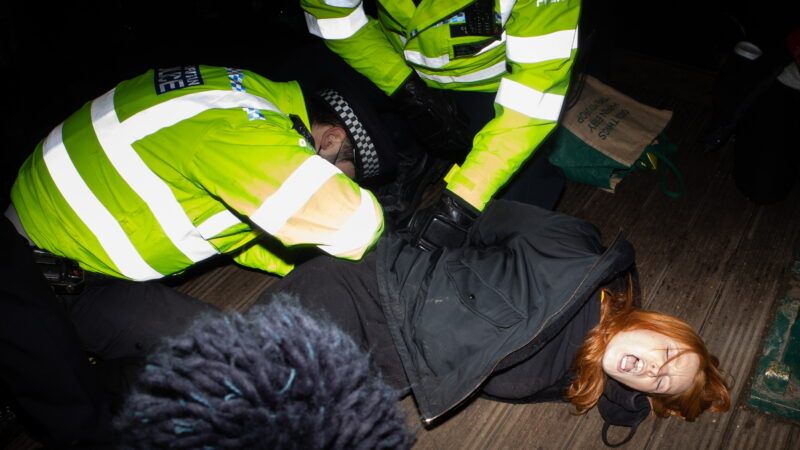England Gave Police Temporary Power During COVID-19 To Shut Down Protests. Now British Cops Want to Keep It.
Cracking down on protesters angry about police violence doesn't exactly inspire civic trust.

British officials used 2020's COVID-19 lockdowns as an excuse to essentially legally ban protests. After a recent spate of mass arrests, Parliament is considering a new crime bill that would permanently grant police greater authority to restrict and shut down protests entirely.
The protests are a response to the death of Sarah Everard in March. A week after she disappeared in South London, Everard's body was found and London Police Constable Wayne Couzens was arrested on suspicion of kidnapping and murdering her.
Everard's death prompted public vigils that turned violent because police attempted to shut them down. The police said the protests violated COVID-19 lockdown rules Parliament passed a year ago. When Parliament was considering the "temporary" law (scare quotes because it actually lasts for two years before sunsetting), civil rights organization Big Brother Watch warned, "It contains sweeping powers to shut down even political assemblies, which could thwart the possibility of public protest against this power grab in the months ahead."
The group was proven right when British police used COVID-19 as an excuse to shut down a vigil to memorialize a woman whose death has been attributed to a police officer. A subsequent anti-lockdown protest in London this past weekend led to even more arrests.
The proposed policing and sentencing bill would, in part, grant police greater authority to shut down protests. They can do so now if they believe a protest will cause property harm or serious disruption to people's lives. The new law would empower police to intervene when a protest is noisy enough to cause "intimidation or harassment" or "serious unease, alarm, or distress" to bystanders. Call it the Pearlclutcher's Veto.
Current law allows police to arrest only those who knowingly commit an offense. The new law would allow police to arrest people that "ought to have known" they were breaking the rules, a provision that seems ripe for abuse. And lest people attempt to argue that this is all about keeping big protests from getting out of hand, the bill specifically states that these new powers could be exercised against one-person protests.
Emmanuelle Andrews, policy and campaigns officer at British civil rights organization Liberty, blasted the effort to clamp down on the right to protest in The Guardian:
Police already have extensive powers to restrict protests, and frequently go beyond them even though it is their duty to facilitate the exercise of this right.
We are still in the grip of a pandemic that has changed all our lives, handed enormous powers to the government and dramatically restricted our protest rights. The proposals in the policing bill are an opportunistic bid from the government to permanently erode our rights.
A few women have noted that the police are responding to Everard's death by suggesting that the best preventative is to put more police in bars and public places, where they can monitor women for their own safety. Yet The New York Times notes that the number of police around women seems to contribute to the problem, not fix it. More than 500 London police officers were accused of sexual assault between 2012 and 2018, but only 43 of them faced disciplinary proceedings. Accusations, of course, don't and shouldn't imply guilt. The point is that the police response to law enforcement behaving violently toward women seems deliberately oblivious.
There's a lot more to this proposed law than a crackdown on protests. It also increases prison sentences for some crimes, introduces new mandatory minimum sentences, reduces the youngest age at which a person can be sentenced to life in prison from 20 to 18, allows more demands and curfews to be placed on people on parole, and allows government officials to intervene to stop a prisoner from automatic parole release if they believe the person's release is a threat to the public. The law would also expand the use of the junk science of polygraph testing for domestic abusers and sex offenders.
While police argue for more authority to control the public, England's political leaders are bemoaning the extremely poor clearance rate for crimes. Data from 2019 shows that in only 8 percent of reported crimes was a suspect actually charged; in 45 percent of the cases, police weren't able to even identify a suspect. Law enforcement agencies in England have yet to explain how stiffer penalties and even more surveillance in one of the most surveilled countries in the world will close those gaps.
